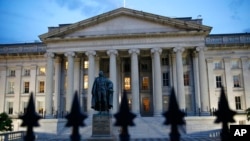Leaked documents allege that some of the world’s largest banks have allowed $2 trillion worth of suspicious or fraudulent activity to take place, including money laundering for criminal gangs and terrorists.
The so-called “FinCEN Files” consist of more than 2,000 Suspicious Activity Reports, or SARs, sent by banks to the U.S. Treasury, alerting the authorities to possible criminal activity, from 1999 and 2017. The files were leaked to Buzzfeed and shared with a global network of investigative journalists.
The documents allege that British giant HSBC transferred $80 million of fraudulent money via the United States to Hong Kong as part of an illegal Ponzi scheme, despite earlier warnings from U.S. authorities.
The documents also say U.S. bank JP Morgan Chase moved $1 billion through a London account that it later discovered may have belonged to Semion Mogilevich, a Russian mafia boss still on the FBI’s Most Wanted list.
German firm Deutsche Bank is accused of transferring dirty cash from money launderers with links to organized criminal gangs and terrorists. A bank spokesperson, Joerg Eigendorf, said Monday that the transactions were all historic.
“What's being reported now is not new, not to us and not to our supervisory authority. Everything has been processed and we had a very close look at everything. But most importantly, we have made huge investments in this [compliance] sector since 2015,” Eigendorf told reporters.
Standard Chartered and Bank of New York Mellon also appear several times in the leaks. All the banks involved say they fully comply with laws and regulations and that the cases are historic.
HSBC said in a statement: “Starting in 2012, HSBC embarked on a multiyear journey to overhaul its ability to combat financial crime across more than 60 jurisdictions. HSBC is a much safer institution than it was in 2012.” HSBC share prices fell more than 5% around the world Monday following the publication of the story, with other bank stocks also recording losses.
Standard Chartered said it ‘took its responsibility to fight financial crime extremely seriously.’
JP Morgan said, “Today, thousands of employees and hundreds of millions of dollars are devoted to helping support law enforcement and national security efforts.”
Bank of New York Mellon said the following: “As a trusted member of the international banking community, we fully comply with all applicable laws and regulations, and assist authorities in the important work they do.”
British politics also is under the spotlight. Lubov Chernukhin, a British citizen of Russian origin, has donated $2.2 million to the Conservative Party since 2012. The FinCEN leaks reveal her husband was secretly funded by Suleyman Kerimov, a Russian oligarch currently under U.S. sanctions, with close ties to President Vladimir Putin. Chernukhin’s donations were legal, according to her lawyers, who say the money has no links to the Kremlin.
So, why weren’t the transactions stopped? Tom Keatinge, who heads the Center for Financial Crime and Security Studies at Britain’s Royal United Services Institute, told VOA that it’s very difficult for banks to spot criminal activity.
“The way I like to visualize this is imagine you’re standing on a street corner on Oxford Street in London, a major shopping thoroughfare. And someone says, ‘Right, you need to identify who either has just been shoplifting or who is about to go shoplifting.’ How easy would you find that?”
Keatinge says the global system for reporting suspicious financial activity is not fit for its purpose.
“Half a million in the U.K., several million every year in the United States of Suspicious Activity Reports are filed by banks and other like accountants and so on. And what do those authorities do with all that data? They obviously can’t look at every single one of those filings.”
“I think the one thing the United States can be congratulated for is its willingness to go after bad actors, particularly bad actors outside the United States, it must be said. That’s rare around the world,” Keatinge added.
Britain stands accused of failing to do enough to tackle financial crime. The anti-corruption group Transparency International estimates $100 billion of dirty money passes through London every year.
“If you want to launder dirty money, then the U.K. has all the tools you need,” says Keatinge. “It has the law firms, it has the global banks, it has the offshore financial centers, it’s got the real estate to invest your money in, it’s got the private schools to spend your money on. And so, the sooner the U.K. staffs its response to financial crime as if it is playing an international role, the better. We have to move faster on fixing the system. Because right now, the criminals have the upper hand.”
Keatinge says despite the banks’ claims, criminal financial activity is still happening on a vast scale – and governments and financial institutions must do far more to crack down.




